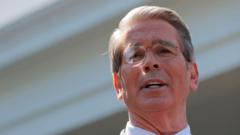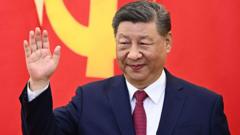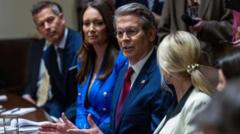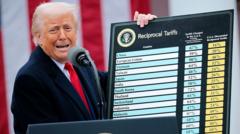In a recent appearance on CNN, Kevin Hassett emphasized the Trump administration’s strategic, high-speed economic initiatives aimed at reshaping global trade and reducing reliance on foreign goods, showcasing a calculated offense rather than chaos.
Kevin Hassett Defends Trump's Economic Strategy as Calculated and Effective
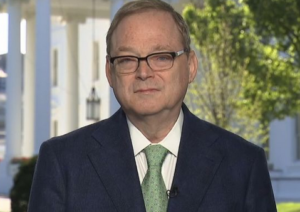
Kevin Hassett Defends Trump's Economic Strategy as Calculated and Effective
National Economic Council Director Kevin Hassett disputes claims of chaos in the Trump administration's economic agenda, advocating for a structured approach to global trade.
The recent economic landscape crafted by the Trump administration faced scrutiny as National Economic Council Director Kevin Hassett pushed back against assertions of disorder, affirming that the White House is executing a swift and impactful strategy to reshape the world economy. During his interview on CNN’s State of the Union, Hassett likened the administration's approach to a “two-minute offense” in football, whereby policies encompassing tax relief, deregulation, and ambitious trade reform are advanced rapidly.
Central to their strategic focus is the Reciprocal Trade Act, which Hassett contends is designed to address a national emergency stemming from America's overreliance on foreign imports, especially during global conflicts. He disclosed that negotiations are actively ongoing with 130 countries that are responding to the U.S. proposal of treating American exports equally to their own, with potential cuts to tariffs as low as 10%.
While he acknowledged the limited engagement with China, Hassett remarked on the positive momentum with other nations, which are making “serious offers” during negotiations. He characterized the scenario not as chaotic, but rather as structured urgency, asserting that the U.S. is now taking a proactive stance in a global economic game that it has frequently struggled to win. As doubts about the administration's global strategy persist among critics, Hassett's unwavering assertion is clear: the U.S. is engaging in calculated efforts to ensure a competitive edge in international trade.
Central to their strategic focus is the Reciprocal Trade Act, which Hassett contends is designed to address a national emergency stemming from America's overreliance on foreign imports, especially during global conflicts. He disclosed that negotiations are actively ongoing with 130 countries that are responding to the U.S. proposal of treating American exports equally to their own, with potential cuts to tariffs as low as 10%.
While he acknowledged the limited engagement with China, Hassett remarked on the positive momentum with other nations, which are making “serious offers” during negotiations. He characterized the scenario not as chaotic, but rather as structured urgency, asserting that the U.S. is now taking a proactive stance in a global economic game that it has frequently struggled to win. As doubts about the administration's global strategy persist among critics, Hassett's unwavering assertion is clear: the U.S. is engaging in calculated efforts to ensure a competitive edge in international trade.






